#Property Manager in Virginia
Text
Property Manager in Virginia
A property manager is someone who oversees a property's day-to-day operations. Property managers are responsible for finding and hiring the right people to take care of a property, collecting rent, and handling any issues that come up. They can also be called upon to deal with day-to-day maintenance and repairs. If you need a property manager.For more information call now at (703)7650300. https://www.nesbitt.realestate/agents
#property management in Arlington Virginia#real estate in Mount Vernon Virginia#real estate in Crystal City#real estate in Old Town Alexandria Virginia#real estate in Fort Hunt#real estate in Franconia#real estate in Del Ray#property management in Mount Vernon Virginia#property management in Crystal City#property management in Old Town Alexandria Virginia#property management in Fort Hunt#property management in Franconia#property management in Del Ray#Property Management Services in carlyle district#Property Management Services in West End#Property Manager in Virginia#rental property management in 22039#Rental Property Management in Old Town#Property Management in Oak hill#property management in falls church
0 notes
Link
#property management#commercialrealestate#Realtor#real estate#virginia real estate#Rental Property Management
3 notes
·
View notes
Text

Unlock success with Cook Group Property Management, your trusted partner for commercial properties in Northern Virginia. Experience superior management that maximizes your property's potential. Our team's dedication ensures your peace of mind while elevating your investments.
1 note
·
View note
Text

Tara Ulysse - Richmond, VA Luxury Real Estate
Tara Ulysse Real Estate is one of the best property management companies in Central Virginia. Get help today, click here for details.
A lifelong resident of Chesterfield, Virginia, working in the Virginia real estate market since 2005. I’m committed to providing the resources and information homeowners, and aspiring owners need for their transactions. For any questions about buying or selling properties in the area, please don’t hesitate to contact me today.
Address: 14321 Winter Breeze Dr, Ste. 31, Midlothian, VA 23113, USA
Phone: 804-944-2326
Website: https://propertymanagementrichmond.com
#Property Management Companies Central Virginia#Central Virginia Property Management#Property Management Chester Va#Property Management Midlothian Va
0 notes
Photo

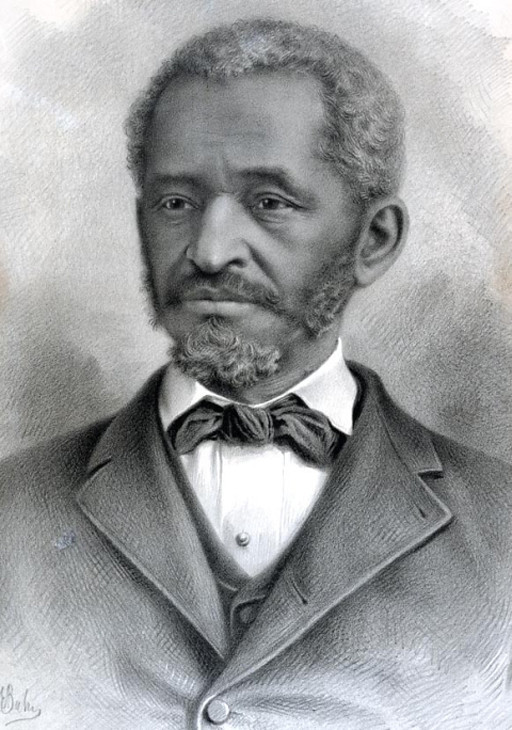
Anthony Johnson (c. 1600 – 1670) was a man known for achieving wealth in the early 17th-century Colony of Virginia. Born in Angola, he was one of the first African Americans whose right to own a slave for life was recognized by the Virginia courts. Held as an indentured servant in 1621, he earned his freedom after several years, and was granted land by the colony.
He later became a tobacco farmer in Maryland. He attained great wealth after completing his term as an indentured servant, and has been referred to as "'the African patriarch' of the first community of Negro property owners in America"
In the early 1620s, Portuguese slave traders captured the man who would later be known as Anthony Johnson in Portuguese Angola, named him António, and sold him into the Atlantic slave trade. António was bought by a colonist in Virginia. As an indentured servant, António worked for a merchant at the Virginia Company. He was also received into the Roman Catholic Church
He sailed to Virginia in 1621 aboard the James. The Virginia Muster (census) of 1624 lists his name as "Antonio not given," recorded as "a Negro" in the "notes" column. Historians have some dispute as to whether this was the same António later known as Anthony Johnson, as the census lists several men named "Antonio
Johnson was sold as an indentured servant to a white planter named Bennet to work on his Virginia tobacco farm. (Slave laws were not passed until 1661 in Virginia; prior to that date, Africans were not officially considered to be slaves)

Such workers typically worked under a limited indenture contract for four to seven years to pay off their passage, room, board, lodging, and freedom dues. In the early colonial years, most Africans in the Thirteen Colonies were held under such contracts of limited indentured servitude. With the exception of those indentured for life, they were released after a contracted period. Those who managed to survive their period of indenture would receive land and equipment after their contracts expired or were bought out. Most white laborers in this period also came to the colony as indentured servants.

António changed his name to Anthony Johnson. He first entered the legal record as an unindentured man when he purchased a calf in 1647.
Johnson was granted a large plot of farmland by the colonial government after he paid off his indentured contract by his labor. On July 24, 1651, he acquired 250 acres (100 ha) of land under the headright system by buying the contracts of five indentured servants, one of whom was his son, Richard Johnson. The headright system worked in such a way that if a man were to bring indentured servants over to the colonies (in this particular case, Johnson brought the five servants), he was owed 50 acres a "head", or servant.
The land was located on the Great Naswattock Creek, which flowed into the Pungoteague River in Northampton County, Virginia.
With his own indentured servants, Johnson ran his own tobacco farm. In fact, one of those servants, John Casor, would later become one of the first African men to be declared indentured for life.
Though Casor was the first person who was declared a slave in a civil case, there were both black and white indentured servants sentenced to lifetime servitude before him. Many historians describe indentured servant John Punch as the first documented slave (or slave for life) in America, as punishment for escaping his captors in 1640. It is considered one of the first legal cases to make a racial distinction between black and white indentured servants

Significance of Casor lawsuit
The Casor lawsuit demonstrates the culture and mentality of planters in the mid-17th century. Individuals made assumptions about the society of Northampton County and their place in it. According to historians T.H. Brean and Stephen Innes, Casor believed he could form a stronger relationship with his patron Robert Parker than Anthony Johnson had formed over the years with his patrons. Casor considered the dispute to be a matter of patron-client relationship, and this wrongful assumption resulted in his losing his case in court and having the ruling against him. Johnson knew that the local justices shared his basic belief in the sanctity of property. The judge sided with Johnson, although in future legal issues, race played a larger role.
The Casor lawsuit was an example of how difficult it was for Africans who were indentured servants to prevent being reduced to slavery. Most Africans could not read and had almost no knowledge of the English language. Planters found it easy to force them into slavery by refusing to acknowledge the completion of their indentured contracts. This is what happened in Johnson v. Parker. Although two white planters confirmed that Casor had completed his indentured contract with Johnson, the court still ruled in Johnson's favor.

In this early period, free blacks enjoyed "relative equality" with the white community. About 20% of free black Virginians owned their own homes. In 1662 the Virginia Colony passed a law that children in the colony were born with the social status of their mother, according to the Roman principle of partus sequitur ventrem. This meant that the children of slave women were born into slavery, even if their fathers were free, European, Christian, and white. This was a reversal of English common law, which held that the children of English subjects took the status of their father. The Virginian colonial government expressed the opinion that since Africans were not Christians, common law could not and did not apply to them
#kemetic dreams#africans#african#Angola#christians#european#english#english common law#casor#johnson v. parker#slavery#indentured#virginia
56 notes
·
View notes
Text
Headcanons! (Isaac & Nigel)
[Warning: Contains spoilers and talk of death (of course there will be)]
Have fun reading!
*Isaac*
I like to think that he is from Virginia, so he has a slight southern accent. He hides it well, but it does slip out every now and then. The accent does come out during specific pronunciations and whenever he is caught off guard. He doesn't hide it around Nigel, however.
The Iliad is one of his favorite Greek stories. Can and will recite it word for word. Give him a quote from it and he can tell exactly which book and line it came from.
This man is autistic. You can't tell me any different. The war was sensory hell for him. His handkerchief is essentially a main grounding object for him due to the texture. He will also fidget with the handkerchief when he is nervous. Prefers his room without too much light, but just enough to see (i.e. candles).
Has an extent amount of knowledge about horses. He grew up raising horses on the farms of either family members or family friends. He took great care of his horse (Chestnut- a bay-colored Arabian stallion) during the war since it reminded of the one he had took care of as a boy. Can name the breed of any horse just by looking at them for a second.
Tired a good chunk of the time. Dying of dysentery was not great- dehydration and malnourishment really took a toll on him in the afterlife. Some days, he can manage, but is really sluggish and attempts to hide it from everyone. Other times, it's hard to get out of the bed.
Has a scar on the left side of his face. Obtained said scar from trying to fix the bayonet onto the gun, dropping it and attempting to catch it, with the blade slicing him in the process. Proceeds to say he got it in a fight with another British soldier, but only few know the truth. (Nigel)
Loves giving Nigel top-of-the-head kisses due to his height.
Forgot everything he was originally going to say while proposing to Nigel. Practiced in the mirror for a full hour, went to go propose, then forgot everything due to nerves. Made up something he guessed was what he originally planned. Turned out great either way!
*Nigel*
Has named every duck on the property. Every duck has a different mannerism and/or marking that makes it subtle to tell which is which. Only him and a few other ghosts can tell which duck is which. (His favorite duck is Percy, a mallard that follows him around from time to time)
Has documented over 2 centuries worth of ant drama. By documented, I mean remembered everything and has not forgot a single event. He has given Isaac an overview of the lore so he can rant about what is going on in the ant colony.
Prefers The Odyssey over The Iliad. Him and Isaac have "debates" over which is superior. They both know that both stories are great on their own, but enjoys having to defend their favorite. It adds a bit of fun to their days.
Big on pet names for his beloved. Seems to come up with a different one every hour. Commonly used ones include: "love", "darling", and any variation of "dove" and "dear".
Enjoys the sudoku puzzles that Sam leaves out. Isaac joins him half of the time to assist in the solving. Record time to solve one alone is 5 minutes. With Isaac, 3 minutes.
Contrary to what Isaac says, Nigel fell first. Caught a glimpse across the field and saw him attempting to instruct his men on how to properly fix bayonets. It did not end well for Isaac, but Nigel thought it was adorable.
Complements Isaac's accent every chance he gets. Absolutely adores the accent.
Has a small poem book inside of his coat. He has most likely read it over 1000 times, and yet still enjoys it as well as the first time reading it.
There will be more to come!
#cbs ghosts#cbs ghosts spoilers#cbs ghosts headcanons#cbs ghosts season 2 spoilers#cbs ghosts season 2#cbs ghosts isaac#cbs ghosts nigel#nisaac
34 notes
·
View notes
Text
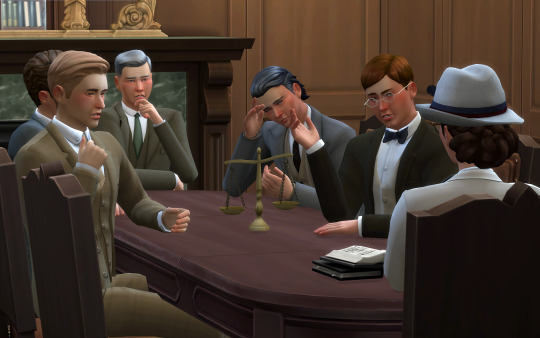

Buying the old alms house was easier than Virginia thought it would be. The previous owners had abandoned it after their manager died in the war; then with many of their aristocratic patrons in financial straights, they could no longer afford to hire anyone else. Overwhelmed and nearing bankruptcy, the owners forfeited the property to a local bank. The bank’s board members were loath to sink money into a charitable institution, so they were willing to let it go for a fraction of what it was worth.
Of course, that didn’t stop them from shirking at Virginia’s offer. She was an unwed 22 year old trying to purchase a property in her own name; she couldn’t even open her own bank account, much less be taken seriously by a board of bank executives. But when she arrived with piles of cash, all of their questions ceased, and they begrudgingly sold her the house.

Virginia left the bank offices and went straight to her new home. Home. It felt so strange that she would have a place to call her own. A place that was all hers, but that could also be shared with so many others. With a small smirk, she immediately bent down to begin clearing the bramblewood from the front door.
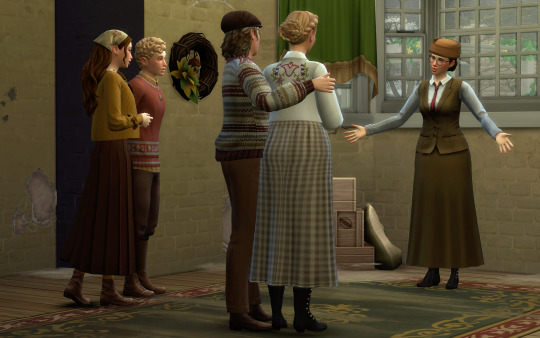
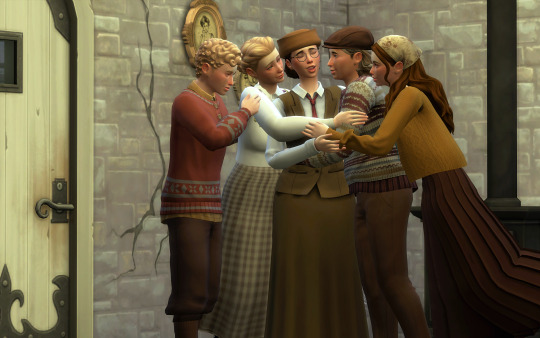

The very next day Virginia returned to the almshouse with her family. She toured them around gleefully, brushing off the extent of damage and debris littered throughout the place.
Most of them were enamored, not so much by the house itself, but by Virginia’s infectious enthusiasm. Florence knew that Virginia couldn’t have possibly been able to afford this home herself; VAD nurse work had been unpaid for four long years. Yet the shine in Virginia’s eyes quieted any of her chastising, as however her daughter had acquired the money, she clearly planned to use it to better the world.
After the tour of the main building, Virginia took them all into the small apartment next door, where the previous owners had housed the manager. Virginia intended to live there and manage the day to day operations herself. Only looking around the room, it became clear to all of the Darlingtons that she would need more help than that to get this house open again. So after congratulating her, everyone picked up a broom to begin cleaning the old alms house together.
#1918#ts4 decades challenge#sims 4 decades challenge#sims 4 historical#ts4 historical#sims 4 legacy#ts4 legacy#sims 4 story#ts4 story#the darlingtons#1910s#wwi era#oliver darlington#florence darlington#virginia darlington#zelda darlington#isaiah darlington
81 notes
·
View notes
Note
What did John think about Thomas Jefferson?
Not much, if the absence of mentions in his writing is anything to go by.
Of course, that's not very surprising, because Jefferson wasn't Thomas Jefferson yet - not yet as (in)famous and nationally prominent as he became later. By the time of Laurens' death in 1782, Jefferson's most notable achievements were drafting the declaration of independence, and serving as the governor of Virginia.
Laurens was certainly in favour of the declaration, but there is no extant evidence that I have come across of what he thought of the language or principles it contained, nor its author.
Nor have I seen any evidence that they crossed paths during Jefferson's tenure as governor. Laurens would probably have thought that Jefferson fleeing from the British was cowardly, as many did, but he did not write down his opinions on that matter.
On a philosophical level, the two men shared some common enlightenment views on fundamental (male) human freedoms derived from nature, the primacy of individual liberty in any form of government, and meritocracy - for example:
There is also an artificial aristocracy founded on wealth and birth, without either virtue or talents; for with these it would belong to the first class. The natural aristocracy [meritocracy] I consider as the most precious gift of nature for the instruction, the trusts, and government of society. And indeed it would have been inconsistent in creation to have formed man for the social state, and not to have provided virtue and wisdom enough to manage the concerns of the society. May we not even say that that form of government is the best which provides the most effectually for a pure selection of these natural aristoi into the offices of government?
Thomas Jefferson to John Adams, 28 October 1813
if you mean_ as seems more probably from what follows in the Sentence that Ambition is clog’d by the Government, and a Man cannot make a Figure by exerting laudable Talents_ that I must beg leave totally to deny_ under a Republican Government there is the fullest Scope for Ambition directed in it’s proper Channel, in the only Channel in which it ought to be allowed, I mean for the Advancement of Public Good_ [...] surely no virtuous philosophic Mind will take Offence that the useful industrious part of the Community, should have their persons and properties equally protected with those of the most enlighten’d Men_ nor think it unreasonable, that they should choose Men whom they judge worthy of the important Trust of Governing_
John Laurens to Francis Kinloch, 16 June 1776
Simultaneously, Laurens would have considered Jefferson a hypocrite on the subject of slavery.
I'm not that familiar with Jefferson beyond this, so if anyone would like to chip in, or point out any sources I've missed, please feel free.
20 notes
·
View notes
Text
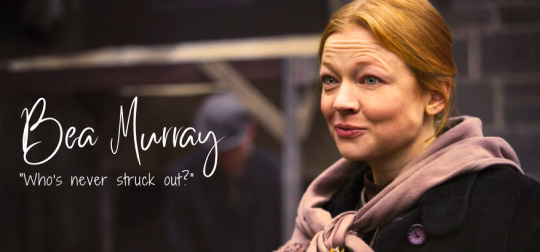
Age: 35
Gender: woman
Sexuality: straight/demisexual
Birthplace: Huntington, WV
Location pre-outbreak: Toledo, OH
Town job: seamstress/weaver/spinster
Previous job: museum curator
Personality traits: resourceful, FUNNY, nihilist (but in the "if nothing means anything, everything can mean everything" way), bookish, tactile, problem-solver
Born in West Virginia and raised in whatever library history book she had on loan at the time, Bea (short for Beatrice) made quite a lot from very little. Resourcefulness kept her fed and entertained growing up when it was only her and her mom. But she rarely wanted for much—except top-of-the-line school supplies. She was reared--with the help of Patsy, Dolly, and Tanya--by a line of "white trash" matriarchs that had all been naive enough to fall in love with drunks, but wise enough to listen when a person told them who they were. Her great grandmother raised six children alone. Her grandmother raised two girls alone. Her mother raised her alone. And so help her god, the cycle would end there.
She wasn’t ashamed of the women she came from--far from it. But the thought of living the same life they led felt like dress-up.
So she studied her ass off. Moved across the country a few different times, following the research. And after a lot of meandering, she landed in Toledo, Ohio. A museum curator. Director of Programs for the Textile Society of America. A big fish in her niche little pond.
She met a gentle, handsome man who never cared for drinking (Rafael), adopted a sweet dog (Trav), and moved into as swanky an apartment as a midsize metropolitan city could offer. Her many mothers cheered her on, even as they stopped recognizing the shape of her. But there were no hard feelings. Only the bittersweet tugging stretch of growing.
And then the world…well…
She got early warning from a well-to-do patron at work who had connections in DC. So she was able to head out of the city with Rafael and Trav before the full outbreak trapped them. They managed to hunker down with a group that put down roots in Put-In Bay. It was safe enough, but unstable. Hunting, scavenging, short-term survival. Day-to-day for nearly 2 years. But after a security breach ravaged the community, they headed south to find Bea’s mom. They made it to her hometown. They found the shell of her childhood home. And if she’d just admitted to herself that there was no one left to find, maybe Rafael wouldn’t have been bitten.
Grieving and lost in every conceivable way, Bea set out on foot, dog in-tow, to find the one nearby spot she remembered that might have survived—Redwood. Her best friend growing up had connections to Beckett Farms and they’d vacationed there on summer break a few times.
She’s been a resident for the last six months, set up in a small trailer on the farm property. It started as the textile studio she slapped together to tackle the task of clothing the community long-term. But after sleeping there more nights than not, she moved in full time. If nothing else, its nice to have nearby access to the small flock of sheep that she’s determined to make use of. And Trav makes a fine shepherd.
4 notes
·
View notes
Text
Goreg Washesaton for richie my beloved
so you may have noticed that this ongoing series of my research of "every historical figure" (/t) for @thereallvrb0y has been on pause for a few weeks and thats bc ive been STRUGGLING to find the rest of them, and i cant. so if anyone needs information on those people, i might just post the bullets from my notes bc im not doing all that work again FKSFKSH they still exist somewhere within my 3000 posts, but i cannot find them bc tumblr sucks <3 anyway, now for
George Washington (pt one)
Georgie was born at his family's plantation, Popes Creek, in Westmoreland County, Virginia, on February 22, 1732, a date that I have memorized for some reason when I don't even have my dad's birthday memorized (sorry dad). His parents were Augustine and Mary Ball Washington. Augustine was a very prominent plantation owner in the area, and also a justice of the county court, so he was a big deal. His first wife, Jane Butler, died and left him with two sons, Lawrence and Augustine Jr., and their daughter Jane.
George was the eldest of the kids from the second marriage. His other siblings were Elizabeth, Samuel, John Augustine, Charles, and Mildred.
The family eventually moved to another one of their properties, Little Hunting Creek, which would become Mount Vernon. They moved again four years later to Ferry Farm.
Augustine Sr. died when George was 11, leaving most of his property to the eldest sons from the first marriage. The remaining income maintained Mary and her children, and George would have been responsible for helping manage their plantation.
George never received a formal education since the funds for that were used on his older brothers. He only received instruction from private tutors. He would have studied reading, writing, basic legal forms, geometry, trigonometry, manners, penmanship, and comportment. I already made a post about his rules of civility, which was a big part of his education.
Mount Vernon, where I got most of my sources from on Washington, of course, has a lot of information on slavery, but I'm not really qualified to talk about all of that since I think it deserves its own separate research, but here's the link for that.
The Washingtons were, however, deeply entangled in the global "institution" (that phrasing makes me uncomfy, it sounds like a business yk). Washington inherited 10 enslaved people from his father, and went on to "inherit/purchase/rent/gain control of" more than 500 enslaved people.
Washington expressed racist sentiments up until the Revolutionary War, which greatly changed his perspective on the definition of liberty and who it applies to. He expressed wanting to free the enslaved people he was responsible for, but couldn't because of the backlash it would cause from him being an international celebrity. He would end up freeing the 123 enslaved people he was able to in his will (that's a whole complicated legal system designed to keep people and their families enslaved for as long as possible and it's honestly exhausting).
Anyway, back to the white people history. Washington got his first job as a surveyor, and it was the only thing he got formal training in. In the mid-1740s he got two surveying jobs (one of which was for a They were going to lay out lots within a large tract along the western frontier of Virginia, and into indigenous territory. He learned more surveying and gained important knowledge of the frontier (*foreboding dramatic movie sound effect*). At the end of the first day, he was shown "a bed of straw with one Threat Bear blanket with double its Weight of Vermin such as Lice Fleas etc. (sic)" He made a promise "not to Sleep so from that time forward chusing rather to sleep in the open Air before a fire. (sic)" This experience ended up being very important to him and getting him out of that cushy rich kid life (*another foreboding dramatic movie sound effect*)
His professional career began in 1749, and recieved a commission for the new Culpepper County (*insert Turn: Washington's spies theme song*), which was probably by the recommendation of Fairfax, who was working on the Governor's council. By 1752, he had completed nearly 200 surveys, totaling more than 60,000 acres. Honestly, I think that if he lived his entire life as just a surveyor, he wouldn't have gone gray in his 40's.
in 1753, Governor Robert fucking Dinwiddie that was this man's NAME in REAL LIFE learned that French troops had moved south from Canada to construct forts in the region south of Lake Erie, which was declared British territory. The area had commercial potential, and Dinwiddie was concerned that the French would fortify the forks of the Ohio River. So, he sent Washington, who was a major in the Virginia militia, to deliver a diplomatic eviction notice to the French in 1753. If that date sounds familiar its bc Georgie is about to have a few major fuck ups that you learned about in middle school. This was known as the Allegheny Expedition, but I have never called it that. It is and will always be the Ohio Eviction.
The expedition was aided by Christopher Gist and local indigenous people. They were escorted by O-non-dowa-gah (also known as Seneca) chief Tanacharison, two Haudenosaunee (Iroquois), and one from the Lenape (Delaware Nation).
This trip was rough. During the trip, Washington hiked for days through snowy woods, fell off a raft into the icy Allegheny River, nearly drowned, and had to spend a freezing night on an island without shelter on the 900 mile journey. I hate to say it, but this dad could beat up your dad. They reached Fort Le Boeuf on December 11, thank fuck. Washington's account was published by Dinwiddie in Williamsburg and London, giving him a reputation at the age of 22.
Despite all that effort, the French just ignored them lmao, bc like what's this little freak gonna do??? So, Dinwiddie dispatched Washington, now a Lieutenant Colonel to assert Virginia's claims a few months later with around 150 men.
They ended up skirmishing with French soldiers on the way, and killed 10 men, including the French commander, Joseph Coulon de Villiers, Sieur de Jumonville. The English under Washington (that's fun to say) retreated to a makeshift fort called Fort Necessity. Washington was forced to surrender when the French surrounded the fort with their indigenous allies. In those surrender terms, Washington accidentally admitted to assassination. This was the start of the French and Indian War, or the Seven Years War for my European fanbase (im so funny).
Washington resigned after that bc his dick was small and he was embarrassed. But, don't worry, his dick regrew and he returned to the frontier in 1755 to serve as a volunteer aide-de-camp (foreshadowing) to General Edward Braddock, who was kind of serving. Braddock had been sent from the King to drive the French from the Ohio Country.
A battle started near the Monongahela River (none of these places have easy names). There was a lot of confusion and troops fled in confusion back to Virginia. Washington was attempting to rally the troops, and had two horses shot out from under him and four bullets shot through his coat. Also Braddock died whoops.
Washington was given command of Virginia's entire military force. He was ordered to protect the entire 350 mile long frontier with a few hundred men, bc everything that happens to this man is fair. This provided him with very necessary experience in commanding troops in stupid ass situations. Eventually, the British took the forks of Ohio in 1758 and Washington retired.
He married our iconic queen Martha on January 6, 1759 and they kissed a lot. He spent 1759-1775 overseeing the farms at Mount Vernon. He constantly worked to improve and expand the mansion and surrounding plantation.
During this time, he established himself as an innovated farmer. In the 1760s, he switched from tobacco to wheat as his main cash crop. He experimented with new crops, fertilizers, crop rotation, tools, and livestock breeding. He actually had some hot takes, but I'm literally the only person who cares bc that shit is actually boring (in case you were wondering, chicken shit doesn't make good fertilizer).
He also expanded the planation to include flour milling and commercial fishing. THEN he built a gristmill, and then began making whiskey, producing over 11,000 gallons of rye whiskey at its peak. Mf slayed.
This era is referred to as the golden years, which I mentioned in Martha's post and everything is wonderful and fine and Washington is happily retired with his family :)....
SIKE time for part 2
#george washington#history#american history#founding fathers#french and indian war#seven years war#do it for richie 💪
12 notes
·
View notes
Text
Week 2: Palo Alto's Unique Blend; Suburban Characteristics and Complex Challenges
This week's readings prompted me to ponder my California trip, especially our visit to Palo Alto, where we explored the city and Stanford University, examining the distinctions and links among urban, suburban, and edge city areas.
Palo Alto, California, located in the San Francisco Bay Area and is part of Santa Clara County, looked like a residential neighborhood when I visited. It featured tree-lined streets, relatively low population density, and a mix of single-family homes and low-rise apartment buildings. When viewed in light of our textbook readings and class discussions, I can see why it is generally considered a suburban area, although it's more accurately described as a city with suburban characteristics. It is not as rural or isolated as some traditional suburbs and has a thriving job market and cultural amenities. I observed a rich diversity in racial and ethnic backgrounds, encompassing white, Asian, Hispanic, African American, and more. Palo Alto's multiculturalism is fostered by the presence of Stanford University and the tech industry, attracting a global population. This trend aligns with Palen's findings that highly educated Asian immigrants tend to settle in suburban neighborhoods with strong employment and educational prospects for their children. Similarly, Latino suburban growth thrives in regions offering significant economic opportunities, challenging the notion of exclusively "lily-white" suburbs (p. 129).
So, while Palo Alto has a suburban feel in many parts of the city, it also has urban and academic elements that make it a unique and vibrant community within the larger Silicon Valley region. I was thus left to wonder why a city like Palo Alto did not become an edge city like Tysons in Virginia or Plano in Texas. Suburbia is increasingly diverse, with some older suburbs maintaining their status due to zoning restrictions and the attraction of high-status residents (Palen p130). Despite Palo Alto's thriving tech industry and evolution since the late 19th century, its development differs from more commercially focused and high-rise-intensive edge cities. It adheres to suburban traits with low-density development, strict zoning, green space preservation, and limited high-rise buildings. Like many U.S. suburbs, it relies heavily on automobile transportation, with residential neighborhoods and shopping areas being less walkable.
I was then curious to know which concerns arose from this low-density development, considering that Silicon Valley will keep on growing as a dominant and dynamic hub. Indeed, Palo Alto faces a delicate balancing act in accommodating the growth of its thriving tech industry while preserving the well-being of its residents. The increasing demand for office and commercial space necessitates careful management to maintain environmental sustainability and the overall quality of life. Additionally, the city grapples with a housing affordability crisis driven by strict zoning, height limitations, and an emphasis on single-family homes. These factors have restricted new housing construction, leading to soaring property values and rents. This affordability gap poses difficulties for lower- and middle-income individuals and families seeking housing in the city, heightening concerns about socioeconomic diversity. While I didn't observe demographic homogeneity, I did note a lack of diversity in terms of residents' socioeconomic backgrounds.
2 notes
·
View notes
Link
Property management refers to the control of a building by a third party, typically a qualified property manager or property management firm. Residential, commercial, industrial, and other purposes are among the real estate kinds that property managers can oversee.
When managing properties remotely, a great property manager is a landlord's greatest asset. The hiring procedure for property management, however, must be understood by you. Since, it will help you to choose the best company for property management in West Springfield, VA.
0 notes
Text
property management services in Northern Virginia
Looking for reliable property management services in Northern Virginia? Cook Group Property Management offers expert solutions to handle your rental properties efficiently. Visit our website now.

0 notes
Text

Tara Ulysse - Richmond, VA Luxury Real Estate
Tara Ulysse Real Estate is one of the best property management companies in Central Virginia. Get help today, click here for details.
A lifelong resident of Chesterfield, Virginia, working in the Virginia real estate market since 2005. I’m committed to providing the resources and information homeowners, and aspiring owners need for their transactions. For any questions about buying or selling properties in the area, please don’t hesitate to contact me today.
Address: 14321 Winter Breeze Dr, Ste. 31, Midlothian, VA 23113, USA
Phone: 804-944-2326
Website: https://propertymanagementrichmond.com
#Property Management Companies Central Virginia#Central Virginia Property Management#Property Management Chester Va#Property Management Midlothian Va
0 notes
Text
THE NOT-ULTIMATE OBVIOUSLY PARTIAL AND INCOMPLETE GUIDE TO EATIN' IN GOTHAM
So you're coming to Gotham City. Where does the discerning traveler get their nosh on? `Cause there's no WAY that we're eating at TGI Friday's.
Well, you're in luck, friendo. This native is going to spill on some of the most famous places in Gotham, as well as less-known local joints that everyone should try.
LUIGI'S
Best. Fookin'. Pizza. In. Gotham. Yeah, they sell by the slice, but getchaself a pie. It's worth it. Classic sicilian, the crust is JUST a hair thicker than norm, but still bendy and thin - it's just not bendy enough to drop all the toppings on the floor when you pick it up. Best of all worlds, amazing homemade sauce. 10/10.
CHEZ VOUS
Y'know the stereotypes about French restaurants being snooty and overpriced? Yeah, toss `em out the window. Chez Vous is the only French takeout joint I know. It helps that the Tarte A La Tomate is basically a puff-pastry pizza with mustard instead of red sauce. It's all very rustic French, even slipping in some Basque cuisine, and it's all damn good - but the best part is it won't break your wallet. Twelve bucks'll get you through almost any dish on the menu. Also, yes, like half the menu is fully vegan. 9/10, they lose a point for pretending they don't know what you're talking about when you ask for "the French pizza thing".
KATYA'S
Formerly "Katya's Italian Kitchen", 3rd Street. Still called that according to the sign that they haven't changed yet. Just plain good Italian. Homemade pasta, and the mushroom tortellini is perfect. It's an open secret that it's a mafia front, but it stays in business because A) the Zucco family hasn't really done anything outside of white collar crime since Tony Zucco got fingered for murder a decade-plus ago, and B) it's pretty deece. 8/10, a little overpriced but solid, don't spring for the calzones.
BIG BELLY BURGER
There's about twenty locations in Gotham, and if you want fast food, yeah it's damn good. They used to have the HQ here and they still treat their restaurants like they're the 'flagships' for the franchise. Expect a big honkin' slab of steamed meat with gooey white cheese in the middle, whatever veg you want (they nickle-and-dime you for anything past pickle and onion but they have a REALLY impressive selection anyway) and the trademark Big Belly Sauce (which I think is just thousand island without pickle but it's still good). The only weakness here is the fries, which are okay, but not great. 7/10, gives me heartburn every time.
BAT-BURGER
This place gains points from my point of view by relentlessly mocking the asshats who keep trying to make Gotham a worse place to live. WHY YES I WOULD LIKE TO JOKERIZE THOSE FRIES! In all honesty it's a good mid-grade fast food place that gets extra points for proper seasoning on everything. Just don't go to the one in Old Gotham, the manager is constantly drunk and I doubt it's EVER been properly cleaned. 7/10 for most locations, 3/10 for OG.
THE ICEBERG LOUNGE
Okay, y'know how it's an open secret that Katya's is a mafia front? The Iceberg Lounge isn't a secret, it relishes in it. This is Ozzie Cobblepot's one 100% legit venture, which is why it keeps surviving when he gets thrown in the slammer (I think it's technically owned by a separate property management company now, so they can't touch it anymore…). Big band music, glorious art deco themeing, and legit the best seafood in the city. 9/10, if you can afford the splurge it's worth it.
CUBBY'S DINING CAR
This diner has been in business since 1937, and they've barely changed the menu since 1937. That means that yes, you can still get a hot Dr. Pepper here, and yes, it's still gross. No-frills breakfast standards and burgers. The "Cub Sauce" is just chili sauce, it's a nightmare for the digestion but it's almost worth it. Bonus points for having a loose meat "miscellaneous poultry" sammich they call "Skymeat". The owner claims that this is a local thing from West Virginia, I really don't buy it. 5/10, menu is a mixed bag but it's an experience, and they never close which is nice.
LOU'S CANDY SHOPPE
While nominally 'just a candy shop', this place actually has a really good menu. Old fashioned malts and egg creams, Gotham style dogs that are as good as any street cart but prepared in a marginally cleaner environment, and even cheesesteaks (with whiz, always). The walls of Lou's are plastered with Gotham history, which Lou himself refers to as 'his trophies', basically anything that he lived through. 8/10, there's only three tables or this would probably rate higher.
IL-SHAN-TEN
If you want decent Japanese food in Gotham Proper, this isn't a bad spot. It's halfway between an izakaya and a diner, and they make really good donburi. The place used to be a mahjong parlor (hence the name) and it's evidently gotten kinda trendy lately? Expect a crowd, but not a bad crowd. 6/10, a little overpriced, but serviceable.
THE GOTHAM BAR AND GRILL
They say this place used to be good years ago. I don't believe it. As a bar, TGBaG is halfway passable, so long as you don't want a cocktail more complex than a boilermaker. As a grill, it's godawful. Burgers come in two varieties - underdone and burnt. Steaks are stingy, the fish and chips tastes indescribable (and not in a good way, but in a Cthulhu kinda way). Fries are passable. 2/10, avoid, the name does not make it a local institution, and the fact that it's been in business since `39 makes it an anomaly, not a mark of pride.
BLACK BASS BAR
Now this is more like it. Closed from six AM to noon, seedy as all get out but lively and fun. The embodiment of a dive bar. Classic Brit style fish and chips, decent mini pizzas, cheap and greasy. 8/10, no, the bartender won't sleep with you but she's fun to hang with.
FOOD JUNCTON
I think it's supposed to say "junction". Had to end this with my favorite anomaly. This place is right outside the stadium (GO KNIGHTS) and it's literally an old carnival food trailer that the put on a foundation and called good. It serves gyros and kebabs in various forms, all to go unless you want to sit on the curb (which a lot of people do). The only drink they serve is mystery-flavor Kool-Aid. Cheap as balls, homemade tzatziki or "happy sauce" (which is equally homemade ranch that they refuse to call ranch), always good. 12/10, a must-have.
Alright, that's it, if anyone has any requests for a short review I'll add `em in later with a reblog.
10 notes
·
View notes
Text
Everyone Knows it's Windy
@flashfictionfridayofficial
(cw: implied, off screen animal abuse in the past)

The last untouched mountain in all of West Virginia stood magnificent and free from being stripped of its towering kingdom of trees. But what protects this monument of nature from profit?
Below on flat land surrounded by hills lies a farm guarded by Mama Windy. A woman of the 60s and in her 60s, she's turned this area into a sanctuary for wounded horses and other animals, and grown attached to the mountain's gifts. From the river flowing down to the brisk air as she climbed up and down to keep her vibrant, she felt half her age and matched it with flowing gray hair and groovy clothes with tie dye purple and orange with hardy blue jeans.
Mama Windy had enough of people and their constant competition and shallow niceness, preferring to use her medical knowledge to help horses and other creatures that have been malnourished, beaten, or abandoned. She loved all the animals but she kept close to her first horse, a brown Clydesdale called Roscoe, who was getting up there in age but still moved around.
Wary but welcoming to most strangers, she held nothing but a grimace for coal companies looking to blow up the mountain beyond her. Her ecological background has made her investigate the local ponds and river for acid, cadmium, lead. Even her own sanctuary would not be immune from bioaccumulation from arsenic and copper, so she'd watch for anyone coming to blow the mountaintop.
On a normal sunny Friday, the Apex Mineral Refinery began surveying the land, and Mama Windy saw this through her window and was ready to chew them out. She inhaled and composed herself as she went out the door to see two workers and a suit.
"G'morning, gentlemen," she drawled with cool grace that hid seething rage. "I don't mean this rudely, but yer on m' property, and it's against the law if I don't want ya."
The suited man strolled over in a genial manner as he smoked a cigarette and blew the smoke in the air. An average looking man in his early 50s, he looked healthier and clean skinned compared to his younger, haggard looking workers.
"Sorry to upset you, ma'am. I'm Al Constance, I'm supervising this survey. No actual drilling has started, and rest assured, you'll be granted a portion of the mineral rights when you relocate."
"Re...locate? Sir, me and mah animals ain't goin.' I don't care how much yer givin,' this is mah home, and there's no other mountain like this around, so it's also stayin.'"
"Look here, ma'am. This mountain is helping no one else. Why, we're doing everyone a favor mining it! It gives money, jobs, and that fuel for your lights."
"I can't argue that. But it's still mah way of life, and if ain't hurtin' anyone, I'm free t' stay."
"Look, lady. I'm playing nice here. You don't think I've busted balls from tougher guys? I can even wait when you drop dead. This is a goddamn gold mine, and the mayor is sure as hell not going to care about this case when I'm paying his kid's way to college! I'll clear this place, and you, and your horses," he snapped his fingers, "just like that!"
"Oh, my," she feigned fear by shrinking. "I guess there's nothin' I can do t' convince you. But I know someone who might."
She whistled and, within seconds, Roscoe and two younger horses charged forward.
"Get 'em!"
Constance and the two workers yelled and ran off from the sight of three monstrous galloping toward them with frightening speed. Roscoe managed to chew up a piece of the suited man's shoulder pad and yielded only when Mama Windy hollered for them.
They returned and let her pet their necks and names, and she giggled at their affection from nuzzling her. At least for now, she and her animals can live in peace, and the mountain affecting their lives can remain strong and steady.
6 notes
·
View notes